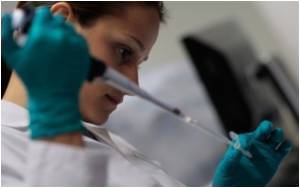
The biological process of mitosis is tightly regulated by specific biochemical checkpoints to ensure that each daughter cell receives an equal set of sub-cellular materials, such as chromosomes or organelles, to create new cells properly.
However, when these checkpoints are miscued, the mistakes can have detrimental consequences. One key component is chromosomal count: When a new cell acquires extra chromosomes or loses chromosomes - known as aneuploidy - the regulation of important biological processes can be disrupted, a key characteristic of many invasive cancers. A cell that divides into more than two daughter cells undergoes a complex choreography of chromosomal motion that can result in aneuploidy.
By investigating the contributing factors that lead to mismanagement during the process of chromosome segregation, scientists may better understand the progression of cancer, said the researchers.
For the study, the UCLA team created a microfluidic platform to mechanically confine cancer cells to study the effects of 3-D microenvironments on mitosis events. The platform allowed for high-resolution, single-cell microscopic observations as the cells grew and divided. This platform, the researchers said, enabled them to better mimic the in vivo conditions of a tumor's space-constrained growth in 3-D environments - in contrast to traditionally used culture flasks.
Surprisingly, the team observed that such confinement resulted in the abnormal division of a single cancer cell into three or four daughter cells at a much higher rate than typical. And a few times, they observed a single cell splitting into five daughter cells during a single division event, likely leading to aneuploid daughter cells.
Advertisement
"Our new microfluidic platform offers a more reliable way for researchers to study how the unique tumor environment may contribute to aneuploidy," the researcher added.
Advertisement
Source-ANI















